Wipeout
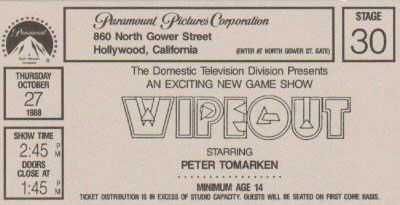
There have been several TV shows called Wipeout. This ticket is for the syndicated game show that ran September 12, 1988 to June 9, 1989 and had Peter Tomarken as its host. The game revolved around a large board that displayed sixteen possible answers to a question such as “Name a movie starring Elizabeth Taylor.” Eleven of the answers on the board were correct and five were wrong. The five wrong ones were the “Wipeout” answers. If a contestant picked a correct answer, the contestant won money and retained control of the board. If the contestant picked a “Wipeout” answer, he or she lost all the money they’d built up and also lost control of the board. It was a fast-paced game and Tomarken was a good host but it never quite caught on.
Larry Sanders Show, The
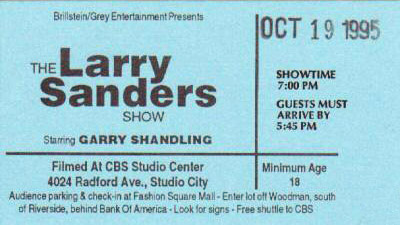
Folks who went to see The Larry Sanders Show tape only got to see portions of each episode. The innovative, widely-acclaimed situation comedy ran on HBO from August of 1992 to May of 1998. Chronicling the life and backstage dealings of a neurotic talk show host (and often employing anecdotes from backstage at real, contemporary talk shows), the series was shot on both film and tape. It was tape when we the audience were watching moments from the show that Larry Sanders starred in for an entity referred to only as “The Network.” It was film when we saw the things the viewers of that show did not see. Tapings, which sometimes involved shooting the tape segments for several episodes, were popular…and attendees said they were a lot of fun even if one only got to see about 20 minutes of taping. The lines between reality and acting were often blurred, both on the series and at these tapings.
It Takes Two
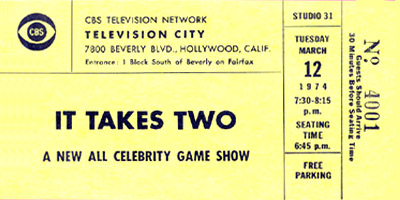
This appears to be a ticket for an unsold pilot. The original It Takes Two aired on NBC from March 31, 1969 to July 31, 1970 and was hosted by Vin Scully. It was a very simple game: Three celebrity couples competed. A question would be raised which had a numeric answer and probably involved an educated guess as to that number. Each member of a couple would give their estimates separately and then the average of the two would be the guess for that couple. So if you knew the answer but your mate was way off the mark, he or she would ruin things for your team. Anyway, this is not a ticket to that series.
It’s also not a ticket to the 1997 revival done for the Family Channel and hosted by Dick Clark. So I’m guessing it’s an unsold pilot.
That Was the Week That Was
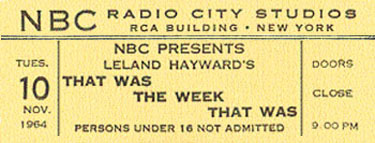
That Was the Week That Was was an acclaimed but short-lived satiric show in England then again in America. The British version went on the air in November of 1962 and went off at the end of ’63. One of its last episodes was among its most memorable: A shortened episode that paid tribute to John F. Kennedy shortly after his assassination. The audio from it was released as a record album and it remains one of the few relics of that live show. Other weeks, it was songs and sketches about what was happening in the world with David Frost as its host.
The pilot for an Americanized version aired in this country on November 10, 1963. Ratings were soft but critics raved about the show which was also headed up by David Frost and which started his rise to fame in the U.S. A weekly version commenced on January 10, 1964. Frost, commuting from the U.K., continued to host or at least dominate the proceedings. Nancy Ames was the “TW3 Girl,” singing the title and closing song which each week featured new and topical lyrics. The rest of the cast changed from week to week but at times included Henry Morgan, Alan Alda, Mike Nichols & Elaine May, Elliot Reid, Buck Henry and many more. For a half hour, they’d talk about items in the news and parody whatever there was to parody.
There were two other notable contributors though you didn’t see much of either on screen. Comedy songwriter Tom Lehrer wrote tunes, many of which he later recorded and put out as an album entitled That Was the Year That Was. And puppeteer Burr Tillstrom, best known for the kids show Kukla, Fran & Ollie invented a new art form with what he called “Hand Ballets.” They were little vignettes set to music in which Tillstrom used his bare hands as puppets and would mime some in-the-news situation. The most memorable one was an interpretation of the Berlin Wall. One of Tillstrom’s hands played the wall; the other represented a person who lived in East Berlin and who was in agony about being separated from his family on the other side of the wall/hand.
TW3 was a modest success in America and NBC kept it on the air expecting that it would draw extra attention during the ’64 Presidential Campaign. What they hadn’t reckoned with was this: It was then relatively easy and not all that expensive for a political candidate to buy a half-hour or even an hour of prime-time TV time. Most of the candidates did that, often pre-empting regular programming with little advance notice. You’d tune in to see your favorite show and discover it was not on and a political ad was in its place. The Republican National Committee took to buying the time slot for That Was the Week That Was, over and over just to keep it off the air and stifle its somewhat-liberal viewpoints. This was a special problem for TW3 as it was done live, and material written for one week was often out-of-date and unusable a few weeks later. Often, they would write and rehearse for several days and then find out that the show would not be airing; that a special touting Barry Goldwater for President would air instead. By the time TW3 did air again, it had lost its mojo and whatever steady viewers it had. It ended in May of ’65.
The ticket above is to a live broadcast that probably did air since it was one week after the election. Leland Hayward, who got billing over the title on tickets and some other places, was a show business entrepreneur who bounced back and forth between being an agent and a producer. His most notable work was on Broadway where he “produced” (i.e., put together the deals for) shows like Mister Roberts, Gypsy and The Sound of Music. His main contribution to That Was the Week That Was was probably just getting it on the air.
Earn Your Vacation
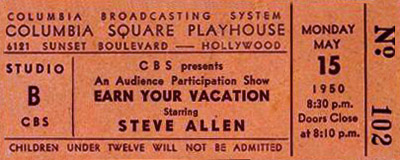
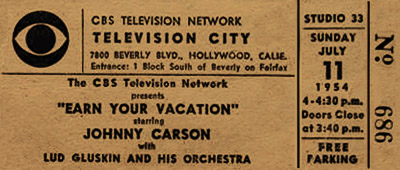
Quick: Name a show that was hosted by Steve Allen and later by Johnny Carson.
If you said The Tonight Show, you’re right…unless someone wants to nitpick. Allen’s version was only called Tonight, not The Tonight Show. But you’d certainly be right if you named Earn Your Vacation. Allen hosted the radio version after a while was followed on the schedule by a half-hour Steve Allen Show done from the same studio after they cleared away whatever was needed to do the game show. On Earn Your Vacation, most of the contestants were school teachers and if they could answer enough questions, they won trips to exotic locales. The show survived into 1951 when it was retooled into Your Tropical Trip with Desi Arnaz. In 1954, it came back to TV as Earn Your Vacation again and it was hosted by the then-new-to-television Johnny Carson.
Mr. Carson must have had some fun with the name of his bandleader. Ludwig Elias Gluskin (1898-1989) headed up a number of popular dance bands throughout Europe in the twenties and thirties, migrated to the U.S. (where he was born) in the forties. This was reportedly because, being Jewish, he had trouble getting work on that continent during World War II. He hooked up with CBS here and became a constant presence on radio programs, including a long stint providing the music for The Burns and Allen Show. He followed Johnny to his next job…The Johnny Carson Show.
Your Tropical Trip
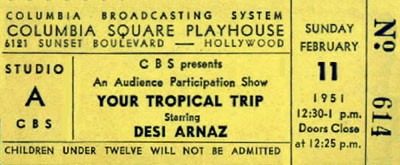
I Love Lucy went on the air October 15, 1951. Here’s what Desi Arnaz was doing just before that. He was the host of Your Tropical Trip, a short-lived CBS radio show that ran on Sundays. It went on the air on January 20, never found a sponsor and went off when Desi got busy playing Ricky Ricardo and producing the new TV series. Most accounts say it was busy work that CBS gave him to keep him and his orchestra in Hollywood and working while I Love Lucy was prepped, though none seem to know when he stopped doing it. Many songs which Arnaz later performed on the classic sitcom were first performed on the radio show and some companies later took radio transcriptions and released them as records.
Your Tropical Trip was a revamp of an earlier radio show called Earn Your Vacation. Later, it was turned back into Earn Your Vacation and put on TV where it was hosted by a new-to-TV kid named Johnny Carson.
Hold That Note
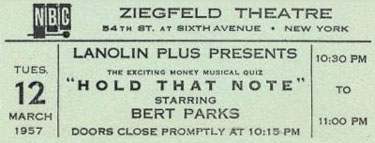
For a while in the fifties, music-themed game shows were very big. One of the less-successful ones was Hold That Note starring Bert Parks. Parks had been hosting the current incarnation of a game show called Break the Bank in that same time slot, sponsored by the same sponsor. This was back when every season, some network would have some version of that show. Its host and rules changed but the hallowed name of Break the Bank went on.
Finally though, the name had run out of stream so on the night of January 22, 1957, the few viewers who did tune it in had a surprise: In a decision made too late to even be in TV Guide, Break the Bank was replaced by Hold That Note. Even some of the contestants were folks who’d won on the previous week’s Break the Bank and thus won the right to come back and play on the next episode.
Largely imitative of the more popular Name That Tune, the idea of Hold That Note was for contestants to identify a song from its first few notes. There were bonus questions and jackpot rounds and Bert sang…but it was all for naught. The show went off the following April and Bert went on to another show. And another show. And another show.
Window Shopping

Darn little is known about the game show Window Shopping. As of this moment, it isn’t even mentioned in the Internet Movie Database. We know it debuted on ABC on April 2, 1962 and went off the following June 29. Bob Kennedy was the host and the way it worked was that three contestants would be shown a photo and would have to remember as many details as they could, then describe what they had seen. They won points for every detail they could give without duplicating an opponent’s response. At the end, the player with the most points won and he or she had those points converted into seconds. They could that study a window of prizes for that many seconds, then they would face away from the window and describe the prizes. Every prize they described, they would take home…and if they remembered one prize in particular, the name of which the host had in an envelope, they’d take home all the prizes.
That was the game. How was the show? Who knows? No one seems to have watched it, no one seems to remember it and no one seems to have a copy of an episode…a sad fate for a series that was all about being observant and remembering what you saw.
Arthur Murray Party, The
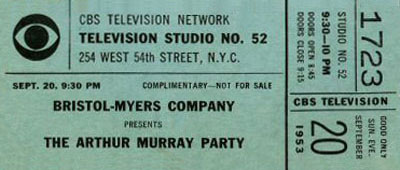
Arthur Murray was the founder and figurehead of a chain of studios that would teach you to dance, thereby making you more attractive and popular. The Arthur Murray Party was a weekly show that was basically an infomercial before that term was invented. Each week, Arthur and his wife Kathryn hosted a big party filled with instructors from his schools who would dance together and with guest stars, making it all look so fun and easy.
The series started in 1950 on ABC, the moved to the DuMont Network, then back to ABC, then over to CBS and continued to rebound between networks, NBC included, until it finally went off in 1960. Its form was often parodied as was the stiffness of his host, who was often compared to Ed Sullivan. But it entertained a lot of people and probably sold them a lot of dance lessons.
Two Top Bananas
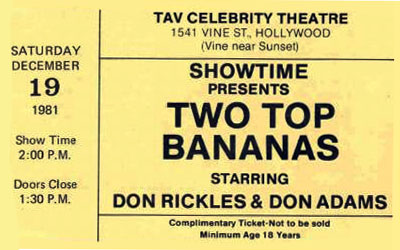
Don Rickles and Don Adams star in one of several early Showtime specials that tried to capture the look and feel of a classic burlesque show with old routines and older strippers. This may also have been the first made-for-cable TV show to be released on home video. I still have a Beta copy of it somewhere.






